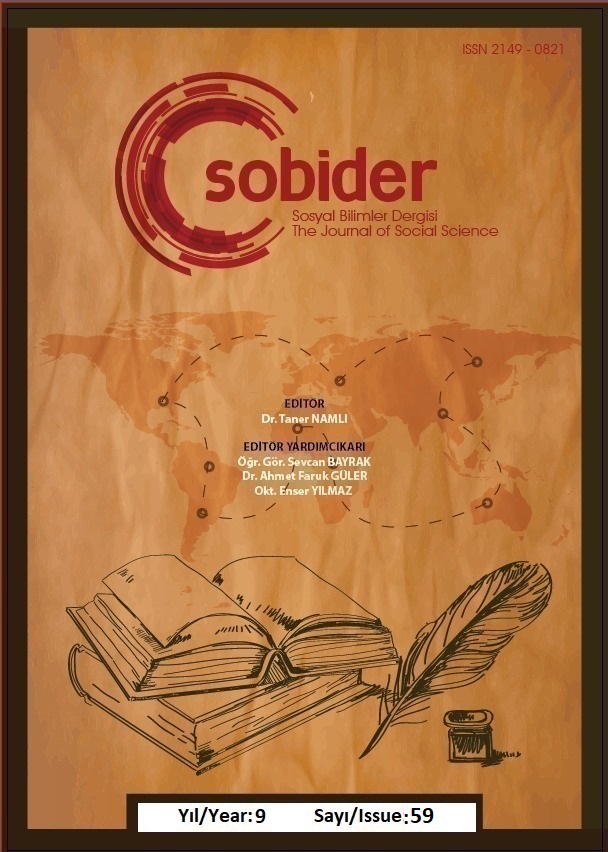Author :
Abstract
- yüzyıl sonları ve 17. yüzyıl başlarında Osmanlı’nın yetiştirmiş olduğu ve birçok meziyeti hâiz olan Okçuzâde Mehmed Şâhî başarılı bir münşi olmanın yanı sıra şâir, âlim, hattat bir devlet adamı ve Osmanlı entelektüelidir. Münşe’âtü’l-inşâ adını verdiği münşeatı ise gerek döneminin gerekse Osmanlı münşeat geleneğinin en kuvvetli eserlerinde biridir. İnşâ türünün bir ürünü olan bu eser siyasi ve sosyal tarih açısından da ufuk açıcı bir yerde konumlanmaktadır. Münşeat metinlerinde karşımıza çıkan belli başlı mektup kaidelerinin, bu türün Türk İslam edebiyatında ortaya çıkışından itibaren, temel hatlarıyla majör değişikliklere uğramadığı görülmektedir. Bir gelenek hâlini almış olan mektup rükûnlarının en önemlilerinden biri ise duadır. Dua bölümlerinde çoğunlukla muhatabın rütbesinin, şan ve şerefinin sürekliliğine ve daha da yücelmesine yönelik dilekler yer almaktadır. Yüzyıllar içerisinde mektup türü incelendiğinde duâ bölümü bulunmayan mektuplara rastlamak neredeyse imkansızdır. Bu makalede Okçuzâde Mehmed Şâhî’nin münşeatındaki mektupların dua cümleleri incelenmiş; mektupların türlerine ve muhataplarına göre bu ifadelerin farklılıkları ortaya koyulmaya çalışılmıştır.
Keywords
Abstract
Okçuzade Mehmed Şâhî, who was raised by the Ottomans in the late 16th and early 17th centuries and has many virtues, is a poet, scholar and calligrapher statesman as well as being a successful scholar. His munşeat, which he named Münşeātü'l-inşā, is one of the strongest works of both his period and the Ottoman munseat tradition. This work, which is a product of inşā, is located in an eye-opening place in terms of political and social history. It is seen that the main rules of munseat texts have not had major changes since they are appeared in Turkish-Islamic literature. One of the most important items of letter, which has become a tradition, is prayer. In the prayer sections, there are wishes for the continuation and further elevation of the rank, glory and honor of the addressee. When the type of letter is examined for centuries, it is almost impossible to come across letters that do not have a prayer section. In this article, the prayer sentences of the letters in Okçuzade Mehmed Şāhį's munşeat were examined; It has been tried to reveal the differences of these expressions according to the types and addressees of the letters.
Keywords
- Afyoncu, Erhan. (2006). "Müteferrika". Ankara: TDVİA, c. XXXII, s. 183-185.
- Babinger, Franz. (1992). Osmanlı Tarih Yazarları ve Eserleri. Ter. Coşkun Üçok, Ankara: Ku ̈ltür Bakanlığı Yay.
- Boran, Uğur. (2020). "Okçuzâde ve en-Nazmu’l-Mübîn fi’l-âyâti’l-erba‘în Adlı Türkçe Kırk Ayet Tefsiri". Şarkiyat Mecmuası / Journal of Oriental Studies, 37/65-108. İstanbul.
- Bostan, İdris. (2009). "Sâlyân". XXXVI/59-60. Ankara:TDVİA.
- Bursalı Mehmed Tâhir. (1972). Osmanlı Müellifleri II. Haz: A. Fikri Yavuz-İsmail Özen, İstanbul: Meral Yay.
- Çakır, Ömer. (2005). Türk Edebiyatında Mektup. Yayımlanmamış Doktora Tezi, Gazi Üniversitesi Sosyal Bilimler Enstitüsü, Ankara.
- Ekinci, Ekrem Buğra. (2018). Dinî Lügat İzahlı Misalli Metinlerle. İstanbul: Arı Sanat Yay.
- Fleischer, Cornell H. (1996). Tarihçi Mustafa Âlî Bir Osmanlı Aydın ve Bürokratı. İstanbul: Tarih Vakfı Yurt Yay.
- Gökbilgin, Tayyib. (1992). Osmanlı Paleografya ve Diplomatik İlmi. İstanbul: Enderun Kitabevi.
- Gökçe, Recep. (2006). Eski Türk Edebiyatında Mektup e Bir Mecmû’a-i Münşeât (İnceleme- Metin-Tıpkıbasım). Yüksek Lisans Tezi, Erciyes Üniversitesi SBE, Kayseri.
- Gültekin, Hasan. (2015). Türk Edebiyatında İnşâ: Tarihî Gelişim-Kuram-Sözlük ve Münşeât-ı Koca Râgıb Paşa. Ankara: Atatürk Kültür Merkezi.
- Haksever, Halil İbrahim. (2018). Eski şair Mektuplarında Dua Geleneği. Littera Turca Journal of Turkish Language and Literature 5 (1). 32-55.
- İpekten, Haluk, vd. (1988). Tezkirelere Göre Divan Edebiyatı İsimler Sözlüğü. Ankara: Kültür ve Turizm Bakanlığı Yay.
- Karatay, Halit. (2008). Hattat Divan Şairleri. Ankara: Akçağ Yay.
- Kâtib Çelebi. (2016). Fezleke I-II, Haz. Zeynep Aycibin, İstanbul: Çamlıca Yay.
- Kınalızâde Hasan Çelebi. (2017). Tezkiretü’ş-Şuarâ. Haz. Aysun Sungurhan, T.C. Kültür ve Turizm Bakanlığı, e-kitap. (E.T. 01.11.2020).
- Mehmed Süreyya. (1996). Sicill-i Osmanî IV-V, Haz. Nuri Akbayar, İstanbul: Tarih Vakfı Yurt Yay.
- Müstakimzâde Süleyman Sadeddin. (2014). Tuhfe-i Hattâtîn. Haz. Mustafa Koç. İstanbul: Klasik Yay.
- Nev'îzâde Atâyî. (2017). Hadâ'iku'l-Hakây'ik fî Tekmîleti'ş-Şakâ'ik. c. II, Haz. Suat Donuk, İstanbul: Türkiye Yazma Eserler Kurumu Başkanlığı.
- Okçuzâde Mehmed Şâhî Bey. (2006). el-Makâmü'l-Mahmûd. Ter: Hür Mahmud Yücer- Mehmed Râzî, İstanbul: Darülhadis Yay.
- Özer, İlknur. (2022). Okçuzâde Mehmed Şâhî ve Münşeâtı: Münşe’âtü’l-İnşâ (İnceleme-Metin). Doktora Tezi, İstanbul Üniversitesi, SBE Türkiyat Araştırmaları Anabilim Dalı, İstanbul.
- Pakalın, Mehmet Zeki. (1983). Osmanlı Tarih Deyimleri ve Terimleri Sözlüğü I-II-III. İstanbul: Milli Eğitim Basımevi.
- Riyâzî Muhammed Efendi. (2017). Riyazü'ş-Şu'arâ. Haz. Namık Açıkgöz, T.C. Kültür ve Turizm Bakanlığı, e-kitap. (E.T. 01.11.2020)
- Selânikî Mustafa Efendi. (1989). Târîh-i Selânikî. c. I-II, Haz. Mehmet İpşirli, İstanbul: İstanbul Üniversitesi Edebiyat Fakültesi Yay.
- Woodhead, Christine. (1988). "Ottoman Inşa and The Art of Letter-Writing Influences Upon The Career of The Nişancı and Prose Stylish Okçuzâde". Osmanlı Araştırmaları/The Journal of Ottoman Studies VII-VIII/ 143-159. İstanbul.
- Yıldız. Fatma. (2016). Mebâni'l-İnşâ: Cild-i Evvel. Yüksek Lisans Tezi, Aydın, Adnan Menderes Üniversitesi, Sosyal Bilimler Enstitüsü.





